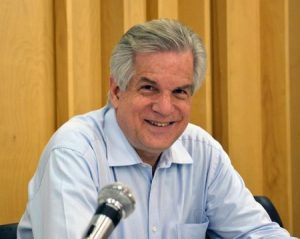Blog
Nixon Was Wrong: Religion and the Presidency, 1960, 2008, and 2012— An Interview with Shaun A. Casey
September 3, 2011
Earlier this year, Dialogue Board member Greg Prince interviewed Shaun Casey, a professor of Christian Ethics at Wesley Theological Seminary in Washington, D.C. Casey’s recent book, The Making of a Catholic President: Kennedy vs. Nixon 1960 (New York: Oxford University Press, 2009) formed the background of this interview. Below is an excerpt from the conversation; you can read the full interview here.
————————————–
Casey: The parallels between Romney’s and Kennedy’s attempts to get the religious questions out of the way are pretty clear, as you can see by comparing their Houston speeches. Kennedy’s Houston speech was a speech of fear and desperation. He had just discovered the scope of the Nixon operation, and he felt like, “Oh my God, I’ve got to address this directly or I’m going to lose control!” When Mitt gave his, the Iowa caucuses were just around the corner. … I saw his strategy, and it’s what I call a three-handed sermon. “On the one hand this, on the other hand that, on the other-other hand this.” You know, when you start counting more than two hands, the audience gets confused.
So, on the one hand, I think Mitt went through a phase where he tried to tell Evangelicals, “I’m really one of you.” In this speech he says, “I’ll tell you who I think Jesus Christ is. But I’m going to stop about three minutes, three seconds into that, and then say I’m not going to go any further because it’s really not appropriate.” He says, “Jesus is Savior and Lord, but we may disagree about what else is really going on there.”
Then he says, “I believe Jesus Christ is the Son of God and the Savior of mankind. My church’s beliefs about Christ may not be all the same as those of other faiths. Each religion has its own unique doctrines and history.” Now that’s the other hand, where he says, “You know, I really am Mormon.”
And then the other-other hand is, “This is kind of all private anyway. I’m like Kennedy, I’m not the Mormon candidate; I’m the Republican candidate who is also a Mormon. So, at one level, I’m one of you, and at another level I’m really not one of you; but it’s all private anyway and shouldn’t count.”
Somewhere between those three hands, I’m dizzy. I’m not really sure what he’s trying to communicate to me. Now a lot of the speech, I think, is laudable. He, in essence, says there’s overlap between the religions. “If you look at the values that my faith produces to me, they are religious toleration, religious freedom, hard work, American values.” He launches into values language, and that’s fine. I think that’s plausible. But I think for the sensitive, Religious Right ears in Iowa, this speech came off as incoherent. It did not ring the bell they were hoping he was going to ring. And the truth is, he can’t go there. He can’t say, “I’m one of you,” plausibly. I think it’s a mistake to try and do that.
Read the full interview here.


 Back to all blog articles
Back to all blog articles

